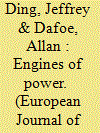|
|
|
Sort Order |
|
|
|
Items / Page
|
|
|
|
|
|
|
| Srl | Item |
| 1 |
ID:
190703


|
|
|
|
|
| Summary/Abstract |
Major theories of military innovation focus on relatively narrow technological developments, such as nuclear weapons or aircraft carriers. Arguably the most profound military implications of technological change, however, come from more fundamental advances arising from ‘general-purpose technologies’ (GPTs), such as the steam engine, electricity, and the computer. Building from scholarship on GPTs and economic growth, we argue that the effects of GPTs on military effectiveness are broad, delayed, and shaped by indirect productivity spillovers. We label this impact pathway a ‘general-purpose military transformation’ (GMT). Contrary to studies that predict GPTs will rapidly diffuse to militaries around the world and narrow gaps in capabilities, we show that GMTs can reinforce existing balances if leading militaries have stronger linkages to a robust industrial base in the GPT than challengers. Evidence from electricity's impact on military affairs, covering the late nineteenth and early twentieth centuries, supports our propositions about GMTs. To probe the explanatory value of our theory and account for alternative interpretations, we compare findings from the electricity case to the military impacts of submarine technology, a non-GPT that emerged in the same period. Finally, we apply our findings to contemporary debates about artificial intelligence, which could plausibly cause a profound GMT.
|
|
|
|
|
|
|
|
|
|
|
|
|
|
|
|
| 2 |
ID:
180455


|
|
|
|
|
| Summary/Abstract |
What resources and technologies are strategic? Policy and theoretical debates often focus on this question, since the “strategic” designation yields valuable resources and elevated attention. The ambiguity of the very concept, however, frustrates these conversations. We offer a theory of when decision makers should designate assets as strategic based on the presence of important rivalrous externalities for which firms or military organizations will not produce socially optimal behavior on their own. We distill three forms of these externalities, which involve cumulative-, infrastructure-, and dependency-strategic logics. Although our framework cannot resolve debates about strategic assets, it provides a theoretically grounded conceptual vocabulary to make these debates more productive. To illustrate the analytic value of our framework for thinking about strategic technologies, we examine the US-Japan technology rivalry in the late 1980s and current policy discussions about artificial intelligence.
|
|
|
|
|
|
|
|
|
|
|
|
|
|
|
|
|
|
|
|
|